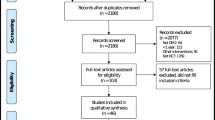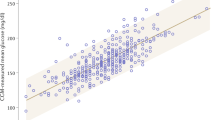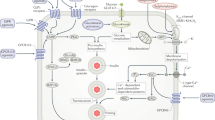Abstract
Cardiovascular complications constitute the major cause of morbidity and mortality in patients with diabetes. The Diabetes Control and Complications Trial (DCCT) and the United Kingdom Prospective Diabetes Study (UKPDS) provided consistent evidence that intensive glycemic control prevents the development and progression of microvascular complications in patients with type 1 or type 2 diabetes. However, whether intensive glucose lowering also prevents macrovascular disease and major cardiovascular events remains unclear. Extended follow-up of participants in these studies demonstrated that intensive glycemic control reduced the long-term incidence of myocardial infarction and death from cardiovascular disease. By contrast, the Action to Control Cardiovascular Risk in Diabetes (ACCORD) trial, Action in Diabetes and Vascular Disease: Preterax and Diamicron Modified Release Controlled Evaluation (ADVANCE) trial, and Veterans Affairs Diabetes Trial (VADT) results suggested that intensive glycemic control to near normoglycemia had either no, or potentially even a detrimental, effect on cardiovascular outcomes. This article discusses the effects of intensive glycemic control on cardiovascular disease, and examines key differences in the design of these trials that might have contributed to their disparate findings. Recommendations from the current joint ADA, AHA, and ACCF position statement on intensive glycemic control and prevention of cardiovascular disease are highlighted.
Key Points
-
Diabetes is associated with an increased risk of microvascular complications and cardiovascular disease
-
Intensive glucose-lowering therapy decreases the risk of microvascular complications and has long-term beneficial effects on the risk of cardiovascular disease
-
Intensive glycemic control to near-normoglycemia might have either no influence or potentially even a detrimental effect on cardiovascular outcomes
-
The currently recommended target for glycemic control in patients with diabetes remains a glycated hemoglobin (HbA1c) level <7.0%
This is a preview of subscription content, access via your institution
Access options
Subscribe to this journal
Receive 12 print issues and online access
$209.00 per year
only $17.42 per issue
Buy this article
- Purchase on Springer Link
- Instant access to full article PDF
Prices may be subject to local taxes which are calculated during checkout
Similar content being viewed by others
References
Nathan, D. M. Long-term complications of diabetes mellitus. N. Engl. J. Med. 328, 1676–1685 (1993).
Fox, C. S. et al. Increasing cardiovascular disease burden due to diabetes mellitus: the Framingham Heart Study. Circulation 115, 1544–1550 (2007).
Roper, N. A., Bilous, R. W., Kelly, W. F., Unwin, N. C. & Connolly, V. M. Excess mortality in a population with diabetes and the impact of material deprivation: longitudinal, population based study. BMJ 322, 1389–1393 (2001).
Kannel, W. B. & McGee, D. L. Diabetes and glucose tolerance as risk factors for cardiovascular disease: the Framingham study. Diabetes Care 2, 120–126 (1979).
Haffner, S. M., Lehto, S., Ronnemaa, T., Pyorala, K. & Laakso, M. Mortality from coronary heart disease in subjects with type 2 diabetes and in nondiabetic subjects with and without prior myocardial infarction. N. Engl. J. Med. 339, 229–234 (1998).
Mazzone, T., Chait, A. & Plutzky, J. Cardiovascular disease risk in type 2 diabetes mellitus: insights from mechanistic studies. Lancet 371, 1800–1809 (2008).
Gaede, P., Lund-Andersen, H., Parving, H. H. & Pedersen, O. Effect of a multifactorial intervention on mortality in type 2 diabetes. N. Engl. J. Med. 358, 580–591 (2008).
Gaede, P. et al. Multifactorial intervention and cardiovascular disease in patients with type 2 diabetes. N. Engl. J. Med. 348, 383–393 (2003).
Buse, J. B. et al. Primary prevention of cardiovascular diseases in people with diabetes mellitus: a scientific statement from the American Heart Association and the American Diabetes Association. Circulation 115, 114–126 (2007).
American Diabetes Association. Standards of medical care in diabetes—2010. Diabetes Care 33 (Suppl. 1), S11–S61 (2010).
Klein, R., Klein, B. E., Moss, S. E., Davis, M. D. & DeMets, D. L. Glycosylated hemoglobin predicts the incidence and progression of diabetic retinopathy. JAMA 260, 2864–2871 (1988).
Selvin, E. et al. Meta-analysis: glycosylated hemoglobin and cardiovascular disease in diabetes mellitus. Ann. Intern. Med. 141, 421–431 (2004).
[No authors listed] The effect of intensive treatment of diabetes on the development and progression of long-term complications in insulin-dependent diabetes mellitus. The Diabetes Control and Complications Trial research group. N. Engl. J. Med. 329, 977–986 (1993).
[No authors listed] Intensive blood-glucose control with sulphonylureas or insulin compared with conventional treatment and risk of complications in patients with type 2 diabetes (UKPDS 33). UK Prospective Diabetes Study (UKPDS) Group. Lancet 352, 837–853 (1998).
Ohkubo, Y. et al. Intensive insulin therapy prevents the progression of diabetic microvascular complications in Japanese patients with non-insulin-dependent diabetes mellitus: a randomized prospective 6-year study. Diabetes Res. Clin. Pract. 28, 103–117 (1995).
Holman, R. R., Paul, S. K., Bethel, M. A., Matthews, D. R. & Neil, H. A. 10-year follow-up of intensive glucose control in type 2 diabetes. N. Engl. J. Med. 359, 1577–1589 (2008).
Nathan, D. M. et al. Intensive diabetes treatment and cardiovascular disease in patients with type 1 diabetes. N. Engl. J. Med. 353, 2643–2653 (2005).
Gerstein, H. C. et al. Effects of intensive glucose lowering in type 2 diabetes. N. Engl. J. Med. 358, 2545–2559 (2008).
Patel, A. et al. Intensive blood glucose control and vascular outcomes in patients with type 2 diabetes. N. Engl. J. Med. 358, 2560–2572 (2008).
Duckworth, W. et al. Glucose control and vascular complications in veterans with type 2 diabetes. N. Engl. J. Med. 360, 129–139 (2009).
Effect of intensive blood-glucose control with metformin on complications in overweight patients with type 2 diabetes (UKPDS 34). UK Prospective Diabetes Study (UKPDS) Group. Lancet 352, 854–865 (1998).
Duckworth, W. C. VA Diabetes Trial (VADT) Update. 69th Scientific Sessions, American Diabetes Association (2009).
Lund, S. S. & Vaag, A. A. Intensive glycemic control and the prevention of cardiovascular events: implications of the ACCORD, ADVANCE, and VA diabetes trials: a position statement of the American Diabetes Association and a scientific statement of the American College of Cardiology Foundation and the American Heart Association: response to Skyler et al. Diabetes Care 32, e90–e91 (2009).
Skyler, J. S. Intensive glycemic control and the prevention of cardiovascular events: implications of the ACCORD, ADVANCE, and VA Diabetes Trials: a position statement of the American Diabetes Association and a scientific statement of the American College of Cardiology Foundation and the American Heart Association: response to Lund and Vaag. Diabetes Care 32, e92–e93 (2009).
Kelly, T. N. et al. Systematic review: glucose control and cardiovascular disease in type 2 diabetes. Ann. Intern. Med. 151, 394–403 (2009).
Chalmers, J. & Cooper, M. E. UKPDS and the legacy effect. N. Engl. J. Med. 359, 1618–1620 (2008).
Skyler, J. S. et al. Intensive glycemic control and the prevention of cardiovascular events: implications of the ACCORD, ADVANCE, and VA diabetes trials: a position statement of the American Diabetes Association and a scientific statement of the American College of Cardiology Foundation and the American Heart Association. Diabetes Care 32, 187–192 (2009).
Riddle, M. C. Update on ACCORD. International Diabetes Federation 2009 World Diabetes Congress. October 22, 2009; Montreal, QC.
Busko, M. Medscape CDC commentary series. ACCORD Update: “One Size Fits All” May Not Be Best Glucose-Lowering Strategy, [online] (2009).
Saydah, S. H., Fradkin, J. & Cowie, C. C. Poor control of risk factors for vascular disease among adults with previously diagnosed diabetes. JAMA 291, 335–342 (2004).
Author information
Authors and Affiliations
Corresponding author
Ethics declarations
Competing interests
The authors declare no competing financial interests.
Rights and permissions
About this article
Cite this article
Brown, A., Reynolds, L. & Bruemmer, D. Intensive glycemic control and cardiovascular disease: an update. Nat Rev Cardiol 7, 369–375 (2010). https://doi.org/10.1038/nrcardio.2010.35
Published:
Issue Date:
DOI: https://doi.org/10.1038/nrcardio.2010.35
This article is cited by
-
A human IgM enriched immunoglobulin preparation, Pentaglobin, reverses autoimmune diabetes without immune suppression in NOD mice
Scientific Reports (2022)
-
FGF1ΔHBS prevents diabetic cardiomyopathy by maintaining mitochondrial homeostasis and reducing oxidative stress via AMPK/Nur77 suppression
Signal Transduction and Targeted Therapy (2021)
-
Cellular and molecular effects of hyperglycemia on ion channels in vascular smooth muscle
Cellular and Molecular Life Sciences (2021)
-
Quality of Diabetes Care in the USA
Current Cardiology Reports (2021)
-
Health-related quality of life and health utilities in insulin-treated type 2 diabetes: the impact of related comorbidities/complications
The European Journal of Health Economics (2020)



